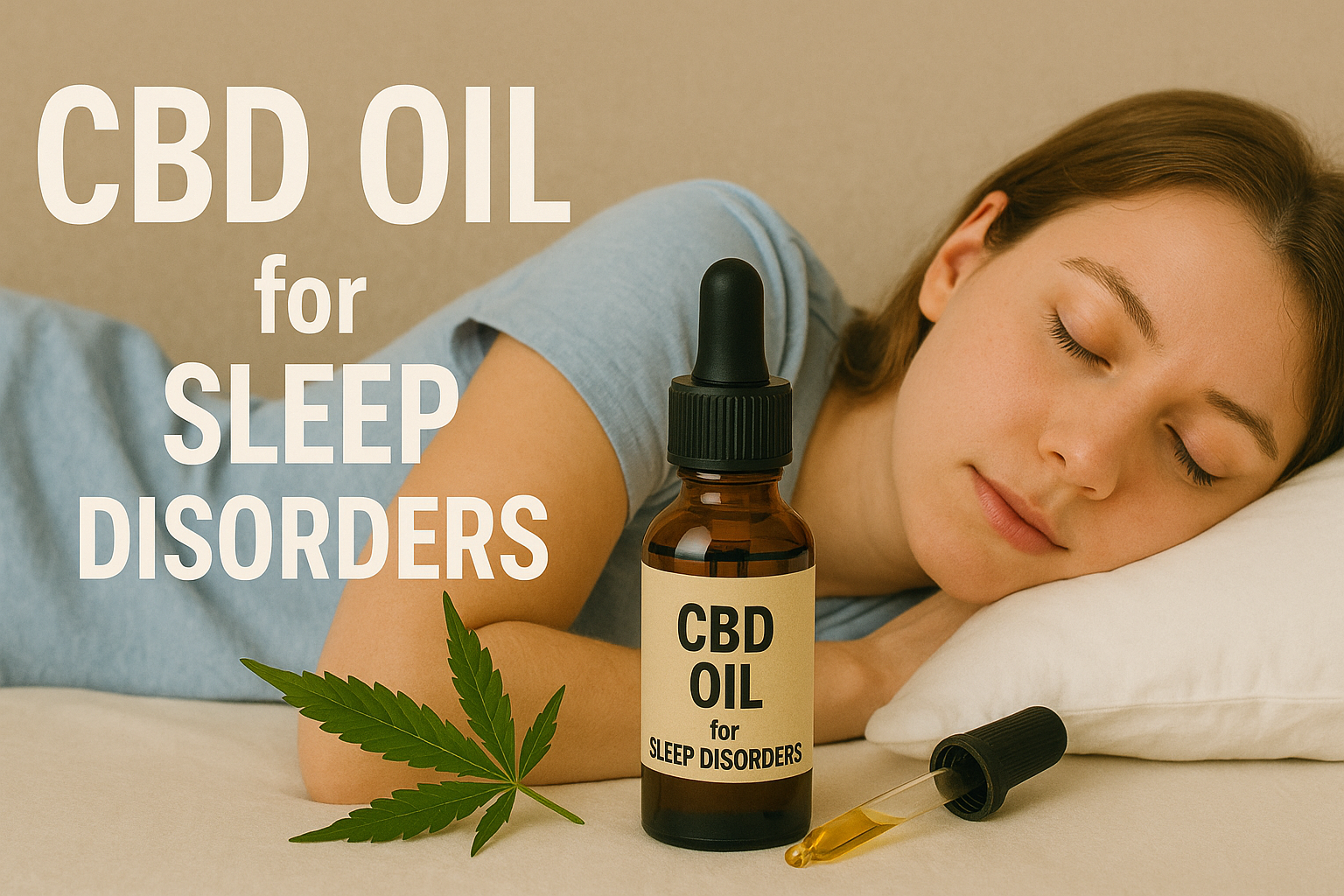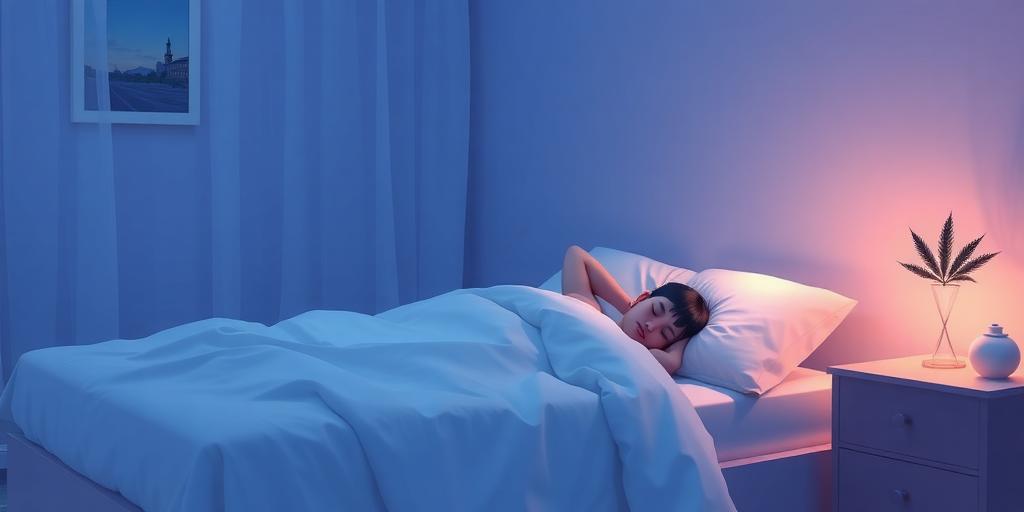
Blog
CBD oil for Sleep Disorders

CBD oil, derived from hemp plants and containing minimal THC, is gaining attention as a potential aid for sleep disorders. Research, including a 2019 clinical case series of 72 adults, suggests that about two-thirds of patients experienced some improvement in sleep after starting CBD. Effects seem mild and can fluctuate over time. Dosages vary widely in studies, from low doses around 25 mg to higher doses up to 600 mg, with evening intake preferred for sleep issues. CBD may help by reducing anxiety and interacting with serotonin receptors, which could improve sleep onset and quality. Side effects are uncommon but include mild drowsiness or dry mouth. Still, more rigorous trials are needed before firm conclusions can be made.
Table of Contents
- What Is CBD Oil and How Is It Made
- Scientific Studies on CBD for Sleep Disorders
- How CBD Works to Improve Sleep
- Recommended CBD Dosages for Sleep Issues
- Sleep Benefits of Using CBD Oil
- Possible Side Effects and Safety Concerns
- Legal Status and Regulation of CBD Products
- Current Gaps in CBD Sleep Research
- Tips for Using CBD Oil Safely and Effectively
- Frequently Asked Questions
10.1. How does CBD oil interact with the body’s natural sleep cycle?
10.2. Can CBD oil cause any side effects that affect sleep quality?
10.3. Is CBD oil effective for all types of sleep disorders, such as insomnia or sleep apnea?
10.4. How long does it take for CBD oil to help improve sleep when used regularly?
10.5. Are there any known interactions between CBD oil and common sleep medications?
What Is CBD Oil and How Is It Made

CBD oil comes from the Cannabis plant, mainly from hemp varieties that contain less than 0.3% THC, the compound responsible for the psychoactive effects or the “high” associated with marijuana. Unlike THC, cannabidiol (CBD) does not cause intoxication, making it popular for therapeutic uses without mind-altering effects. To produce CBD oil, manufacturers use several extraction methods such as CO2 extraction, ethanol extraction, and oil infusion. These processes concentrate the CBD while removing unwanted plant materials. The extracted oil is often combined with carrier oils like MCT oil to improve absorption in the body. CBD oil is sold in various forms including pure tinctures, capsules, edibles, topical creams, and beverages. The hemp plants used for extraction are cultivated under strict regulations to keep THC levels below legal limits. Depending on the product type, some CBD oils retain trace amounts of THC and other cannabinoids. Full spectrum oils include all cannabinoids, broad spectrum oils remove THC but keep others, and isolates contain only pure CBD. The quality and effectiveness of CBD oil depend heavily on the source hemp, extraction method, and third-party testing that verifies potency and checks for contaminants. Consumers are advised to look for certificates of analysis (COA) to ensure that what they buy meets safety and labeling standards.
Scientific Studies on CBD for Sleep Disorders
Several clinical studies have explored CBD’s potential to improve sleep disorders, though the research is still in early stages. A notable 2019 clinical case series involving 72 adults found that about two-thirds reported better sleep after taking CBD, typically in doses ranging from 25 mg to 175 mg daily. However, these sleep improvements were generally mild and varied over time, with anxiety symptoms showing more consistent benefits. Higher-dose studies, using 160 mg to 600 mg CBD, demonstrated increased total sleep time and sedative effects in small trials, suggesting dose may influence outcomes. Mechanistically, CBD appears to interact with serotonin receptors (5-HT1A) and the endocannabinoid system, which may help reduce anxiety and regulate sleep cycles. It might also lower cortisol levels, a stress hormone linked to poor sleep quality. CBD’s calming effects could address sleep problems related to anxiety, pain, PTSD, and certain neurological conditions. Importantly, most studies report good tolerability with no serious adverse effects. Still, these findings come from small sample sizes and observational designs, so more rigorous randomized controlled trials are needed to confirm CBD’s effectiveness and determine optimal dosing for sleep disorders.
How CBD Works to Improve Sleep
CBD interacts with the body’s endocannabinoid system, which plays a key role in regulating mood, stress, and sleep. Unlike THC, CBD does not strongly bind to cannabinoid receptors but modulates them alongside other neurotransmitter systems, including serotonin receptors like 5-HT1A. This interaction may help reduce anxiety, a common cause of sleep disruption. By potentially lowering cortisol levels, the stress hormone linked to poor sleep quality, CBD can promote a calmer state. At low to moderate doses, CBD tends to have calming and anxiolytic effects, which may shorten the time it takes to fall asleep. Higher doses might produce sedation, helping users stay asleep longer. CBD also appears to counteract some negative effects of THC, offering relaxation without intoxication. Additionally, by easing pain or anxiety, CBD can indirectly improve sleep for those whose rest is disturbed by these issues. It’s important to note that CBD’s effects on sleep vary depending on the dose, timing, and individual biology, and the exact neurochemical pathways involved are still under study.
Recommended CBD Dosages for Sleep Issues

Clinical studies show that CBD doses for sleep can vary widely, from as low as 10 mg up to 600 mg per day, depending on the individual and the severity of their condition. For mild sleep disturbances or anxiety-related sleep problems, lower doses between 10 and 25 mg often prove effective. Higher doses, ranging from 160 mg to 600 mg, have demonstrated sedative properties in some trials, but such amounts may be impractical or costly for daily use. Typically, CBD is taken in the evening to help with sleep onset and maintenance. Since no official dosing standards exist, it’s best to start with a low dose and gradually increase it, tailoring the amount to factors like body weight, metabolism, and symptom severity. Consistency is key, as noticeable improvements in sleep might take several weeks. Patients should consult healthcare providers before making dose changes, especially when taking other medications. Overusing high doses can lead to excessive drowsiness or other side effects, so careful titration and monitoring are important for safe and effective use.
| Dosage Range | Effectiveness | Typical Use Case | Notes |
|---|---|---|---|
| 10-25 mg/day | Effective for mild sleep disturbances and anxiety-related sleep problems | Low to moderate dosing, often starting point | Evening administration common; gradual titration advised |
| 160-600 mg/day | Sedative effects and increased total sleep time noted | Used in small research trials for more severe sleep disorders | Not practical daily dose for most; may cause excessive drowsiness |
| Up to 1500 mg/day | Long-term safety data exists but limited | Rare, high-dose use in controlled settings | High cost and potential side effects limit routine use |
| Varies | Personalized dosing recommended | Dependent on body weight, metabolism, and severity of symptoms | Consult healthcare provider before adjusting dose |
Sleep Benefits of Using CBD Oil

CBD oil has gained attention for its ability to improve sleep quality by shortening the time it takes to fall asleep and increasing overall sleep duration. Many people struggling with insomnia, especially when linked to anxiety or chronic pain, report relief after using CBD. This is largely due to its anxiolytic properties, which help reduce stress and racing thoughts that often disrupt sleep. Additionally, some research suggests CBD may benefit those with sleep disturbances related to PTSD and neurological conditions by promoting steadier, more restful sleep cycles. Users often notice they feel less restless during the night and wake up fewer times, contributing to a deeper, more restorative sleep experience. Part of CBD’s positive effect comes indirectly from its ability to ease pain and stabilize mood, both of which can interfere with healthy sleep patterns. Compared to traditional sleep medications, CBD generally has a favorable safety profile and carries a lower risk of dependency, making it a suitable complementary option alongside other treatments. Ongoing studies are exploring how CBD might support the regulation of circadian rhythms, potentially helping the body maintain a natural sleep-wake cycle. While dosing varies and individual responses differ, many find evening use of CBD oil helpful for calming the mind and body to prepare for sleep.
Possible Side Effects and Safety Concerns
CBD is generally well tolerated, with most side effects being mild and temporary. Common issues include fatigue, drowsiness, dry mouth, diarrhea, and reduced appetite. Some users may notice mild sedation, especially when starting treatment, though this often lessens over time. Rare side effects like behavioral disinhibition or dry eyes have been reported but are uncommon. It’s important to be aware that CBD can interact with certain medications, such as blood thinners and anti-epileptic drugs, potentially altering their effectiveness or blood levels. No lethal overdoses have been documented, and the risk of dependence or abuse is considered low. However, product quality varies widely, with some CBD oils containing inaccurate amounts of CBD or THC, or being contaminated with pesticides and heavy metals, especially when not third-party tested. Because long-term safety data are limited, caution is advised when using CBD regularly over extended periods. To minimize risks, consumers should select products verified by independent labs and consult healthcare providers before combining CBD with other treatments.
Legal Status and Regulation of CBD Products
CBD products occupy a complex legal landscape that varies widely depending on location. In the United States, the FDA has approved only one CBD product, Epidiolex, which is used to treat certain rare epilepsy syndromes. Beyond this, CBD derived from hemp plants containing less than 0.3% THC is federally legal, but the regulatory framework remains unclear and inconsistent. Individual states have their own rules: some fully allow medical or recreational use of CBD, while others impose strict restrictions or outright bans. This patchwork of laws means consumers need to be vigilant about local regulations before purchasing or using CBD products. Quality control is another concern since many CBD items sold online and in stores are not rigorously tested. Some states mandate product testing and clear labeling, but others have minimal oversight, leading to frequent mislabeling issues, including inaccurate THC content. Products marketed as full spectrum, broad spectrum, or isolate differ in their THC levels and legal status, which can affect both legality and user experience. The FDA also warns consumers to be cautious of unapproved health claims made by some manufacturers, as these claims are not backed by sufficient evidence. Given that regulations continue to evolve, staying informed about the latest legal developments is essential for anyone considering CBD for sleep or other uses.
Current Gaps in CBD Sleep Research
Most of the current evidence supporting CBD oil for sleep disorders comes from small, observational studies that often lack placebo controls. This limits the strength of conclusions about its true effectiveness. Large-scale, randomized, double-blind clinical trials are still needed to confirm both the efficacy and safety of CBD for various sleep issues. Another challenge is the unclear optimal dosing: studies report a wide range of doses from as low as 10 mg to several hundred milligrams daily, but no standardized guidelines exist for different types of sleep disorders. Additionally, long-term effects of chronic CBD use on sleep have not been thoroughly studied, so it is unknown how ongoing use might impact sleep quality or overall health over months or years. Product variability also complicates research, as differences in CBD concentration, added ingredients, and purity make it difficult to compare results across studies or recommend specific formulations. Because public interest in CBD is high, the placebo effect may play a significant role in reported benefits, which underscores the need for well-controlled trials. Mechanistic understanding of how CBD influences sleep regulation remains incomplete, especially regarding its interactions with neurotransmitters and neurohormones. Moreover, potential interactions between CBD and other sleep medications require more exploration to ensure safety. Data on CBD use in specific populations such as children, the elderly, or pregnant women are very limited, leaving gaps in guidance for these groups. Lastly, a lack of standardized outcome measures in research reduces the quality and comparability of findings, making it harder to draw firm conclusions or develop clear clinical recommendations.
Tips for Using CBD Oil Safely and Effectively
Before starting CBD oil, it’s important to talk with a healthcare provider, especially if you’re taking other medications, to avoid any unwanted interactions. Choose products that have been tested by third-party labs to confirm the CBD and THC levels and ensure purity. Begin with a low dose and slowly increase it until you notice the desired effects, as CBD affects everyone differently. If you’re using CBD to help with sleep, taking it in the evening is usually best. Keep an eye out for side effects like drowsiness or digestive discomfort, and adjust your dose if needed. Avoid driving or operating heavy machinery until you know how CBD impacts you personally. Never replace prescribed sleep medications without consulting your doctor. To maintain quality, store your CBD products in a cool, dry place away from direct light, and always check batch numbers and expiration dates to avoid using spoiled products. Lastly, stay updated on local laws and any product recalls to ensure you’re using CBD legally and safely.
- Consult a healthcare provider before starting CBD, especially if on other medications.
- Choose products tested by third-party labs to verify CBD and THC content and purity.
- Start with a low dose and gradually increase until desired effects are achieved.
- Take CBD in the evening if targeting sleep improvement.
- Monitor for side effects like drowsiness or digestive issues and adjust dose accordingly.
- Avoid driving or operating heavy machinery until you understand how CBD affects you.
- Do not replace prescribed sleep medications without medical advice.
- Store CBD products in a cool, dry place away from light to preserve potency.
- Keep track of product batch numbers and expiration dates to avoid spoiled products.
- Stay informed about local laws and product recalls to ensure legal and safe use.
Frequently Asked Questions
1. How does CBD oil interact with the body’s natural sleep cycle?
CBD oil influences the body’s endocannabinoid system, which helps regulate sleep and wake cycles. It may promote relaxation and reduce anxiety, making it easier to fall asleep and stay asleep throughout the night.
2. Can CBD oil cause any side effects that affect sleep quality?
While many people tolerate CBD oil well, some may experience side effects like dizziness, dry mouth, or changes in appetite. In rare cases, it could interfere with sleep if taken in high doses, so starting with a low dose is important to monitor any negative effects.
3. Is CBD oil effective for all types of sleep disorders, such as insomnia or sleep apnea?
CBD oil may help with certain sleep issues like insomnia or anxiety-related sleep problems, but it is not a cure for all sleep disorders. For conditions like sleep apnea, it should be used cautiously and not as a replacement for prescribed treatments without consulting a healthcare professional.
4. How long does it take for CBD oil to help improve sleep when used regularly?
The time it takes can vary depending on the individual and dosage, but some people notice improved sleep within a few days to a couple of weeks of consistent use. Regular use may help build its calming effects, but patience and proper dosing are key.
5. Are there any known interactions between CBD oil and common sleep medications?
CBD can interact with certain medications, including some sleep aids, by affecting how the body processes those drugs. It’s important to consult a healthcare provider before combining CBD oil with any prescribed medications to avoid potential side effects or reduced effectiveness.
